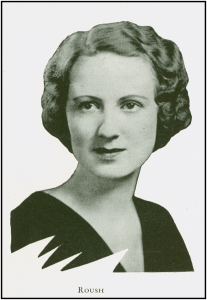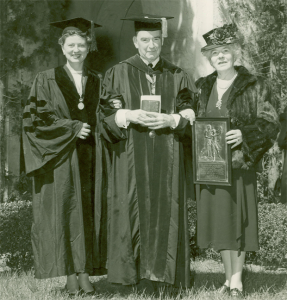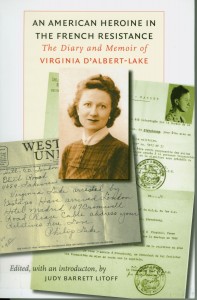|
Our new lobby exhibit features Virginia Roush d’Albert-Lake, whose heroism and courage led to her receiving many honors for her work in the French Resistance. After graduating from Rollins, Virginia made a trip to France, where she met and fell in love with Philippe d’Albert-Lake. Though her mother strongly objected to her moving away (even taking to her bed for a week), Virginia married Philippe in 1937 and began a new life in France. When the Second World War broke out, Philippe urged Virginia to move back to the safety of U.S. But she refused, determined to stay with her husband. Not only did she insist on staying, but she joined her husband in the Resistance in 1943, helping dozens of downed Allied airmen to escape capture by the Nazis. On June 10, 1944, Virginia was arrested by the Gestapo. Hearing of her capture, some feared for their own safety and that of Allied airmen in hiding, but Philippe said confidently, “Virginia will never talk—no matter what they do to her” (Reader’s Digest, August 1991). His faith in her would prove to be justified. On her way to interrogation, she ate a list of names of Resistance fighters. She refused to reveal any important information, and ultimately endured 11 months as a prisoner, mostly in the Ravensbruck concentration camp. When freed in May 1945, sick and weak, she weighed only 76 pounds. As Judy Barrett Litoff, editor of Virginia’s memoir, wrote: “Despite her arrest and the harrowing months that she spent in German concentration camps, Virginia never regretted her actions. Years later, when asked how she survived this horrible ordeal, she responded with steely resolve: “It was a matter of morale. You couldn’t let them see you weep. The women who wept at night were usually dead by morning. You couldn’t give in” (An American Heroine in the French Resistance, xxxii). After the war, with her health restored, Virginia gave birth to her only child, Patrick. He later remembered his mother as someone who never considered herself a hero, just someone who did what any normal person would have done. He also wrote that she was anything but sad: “In fact, she was full of life. She loved life. She had a fantastic sense of humor. It was very sharp, very American. And she loved having fun” (ibid, xxxviii). In February 1947, Virginia came back to Rollins and received the College’s Decoration of Honor. In a letter thanking President Hamilton Holt, she said that this award “means more to me than any I have because it is of such personal significance,” and that her visit had “brought me some of the happiest experiences of my life.” Virginia (left) at Rollins in 1947, with President Hamilton Holt and opera singer Louise Homer Virginia and her family lived quietly in France after the war, where she had a business dealing in antique dolls. She received many honors for her Resistance work, including France’s Legion of Honor award, the Croix de Guerre, and the Maltese Cross. Although she was “thrilled to get such lovely awards,” she said, “. . .I don’t really see it. I did the only thing I could do at the time.” As she explained it, “I believe firmly in doing the right thing and that’s what we were doing” (St. Petersburg Times, 5/30/93). She died in 1997. Her story is told in the book An American Heroine in the French Resistance: The Diary of Virginia d’Albert-Lake (Fordham University Press, 2006), available at the Olin Library. For more information and additional photographs, please visit http://www.francetoday.com/articles/2011/01/25/an-american-heroine.html . ~ by D. Moore, Archival Specialist |




Fabulous story! I am thrilled to see you folks have a blog. So often I miss a chance to have a good look at the Rollins exhibits, but this blog will help spread the word of great stories like Virginia Roush for years to come. Well done!
You’ve written an excellent summary of a life of courage and have inspired me to read the book. Thanks for starting such an interesting blog about Rollins treasures! I look forward to more posts.
What an amazing story of a true heroine!
Thank you for this great blog.
Kim
Where did Virginia gather all the information about the war? Considering that she wasn’t fighting on the battlefield, where did she extract her information from?